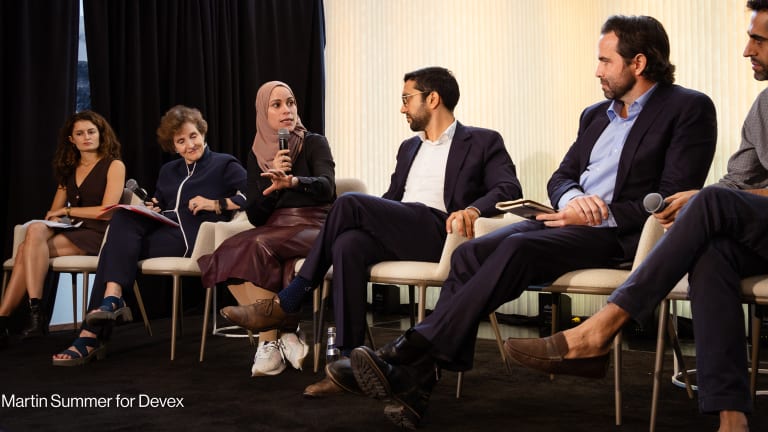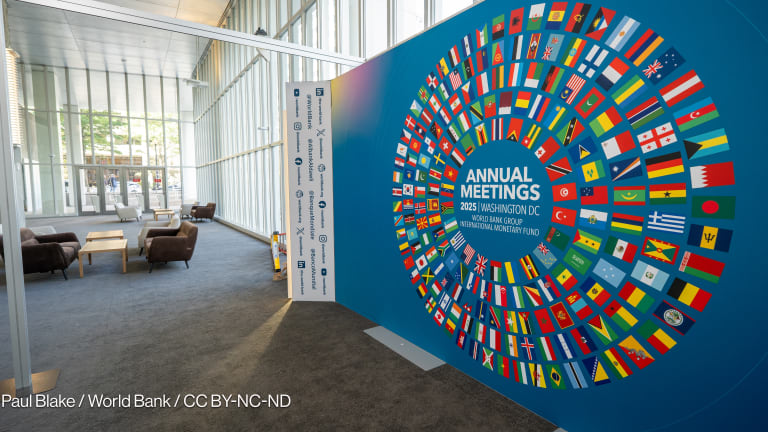Addis Ababa: Financing the future or financing failure?
After a week of meetings, roundtable discussions and negotiations over contentious issues, #FFD3 eventually succeeded in producing an agreed Addis agenda. Devex discusses what’s in the final document — and what’s not — and what some development finance experts have to say.
As the precursor to the sustainable development goal negotiations in New York and the climate talks at COP21 in Paris, the third International Conference on Financing for Development in Addis Ababa, Ethiopia, was supposed to usher in a new era in global development and international cooperation. But while the United Nations hailed the FFD3 outcome as a groundbreaking, “critical step forward in building a sustainable future for all,” many civil society organizations and development leaders did not see it the same way. The conference’s outcome document — better known as the Addis Ababa Action Agenda — represents the world’s plan to implement and finance the new post-2015 development agenda. And although it expresses global support for an array of measures aimed at helping developing countries achieve self-reliance and sustainable economic transformation by raising domestic revenues and attracting private finance, it lacks the teeth needed to scale up existing resources and draw increased official aid from traditional donors. “The outcome document was long on good intentions but fell far short on concrete commitments,” Paddy Carter, a tax expert at the Overseas Development Institute, told Devex. The Addis agenda details a financial plan to address a wide range of issues, including social inequality, climate change, tax evasion and illicit financial flows, but the majority of civil society believe the outcome lacks real actionable deliverables and fails to tackle the problems from a structural level. Below are some of the most important points to come out — or not come out — of the agenda. 1. No new financing commitments. In terms of official development assistance pledges, the Addis agenda contains only a reaffirmation of donors’ respective financial commitments. This includes allocating 0.7 percent of donors’ gross national income to ODA and 0.15 to 0.20 percent of their GNI specifically for least-developed countries. But the 0.7 percent target, which was set more than four decades ago, is still not being met by many countries. With the more ambitious post-2015 development agenda, it has now become imperative that all countries meet this target, preferably much sooner than later. If this target operates within the time frame of the post-2015 agenda, or with 2030 as the deadline, it will be far too late to achieve the SDGs. “The action agenda provided no new timeline or new commitments, with the exception of the EU who said they’d reach the target by 2030 — 15 years after their original deadline,” Martin Hojsik, International Tax Power campaign manager for ActionAid International, told Devex. While the outcome document was somewhat conservative in setting the bar for ODA commitments, it highlighted the role of domestic resource mobilization in this new era of development. Many feel, however, that leveraging untapped developing country funds by improving tax collection and cracking down on corruption should only be half of the story. “The other half must be about sharing the fruits of growth both within and across countries, and reaching those being left behind by progress,” ODI’s Carter said. 2. Commitment to a new social compact. Seen by many as one of the best things to emerge from the talks at Addis Ababa, a new social compact between countries aims to “finish the unfinished business of the Millennium Development Goals,” by delivering social protection and basic public services to the poorest and most vulnerable, particularly persons with disabilities, indigenous persons, children, youth and older persons. The services will cover health, education, energy, and water and sanitation. “If put into reality, this could lead to a step change toward the ambition to ‘leave no one behind,’ one of the key foundations of the SDG agenda,” Romilly Greenhill, team leader for development finance at ODI, told Devex. But while all welcomed the inclusion of a new social compact in the Addis agenda, they were disappointed in the lack of a concrete funding plan for these public services for the poor. “So for me one of the best things about the [Addis agenda] was also one of the greatest disappointments: There is a commitment to a basic social compact and social protection for all, but nothing about how to finance nationally owned social protection programs in countries that lack the domestic resources to do so themselves,” Carter said. 3. The absence of a UN global tax body. Perhaps most glaring in the FFD3 outcome document is the absence of a U.N. intergovernmental tax body — one of the most contentious issues at Addis Ababa last week. While the Group of 77 nations lobbied for the creation of a global tax body with universal membership that would lead international tax cooperation, rich countries — led by the United Kingdom, United States and Japan — attempted to block the motion, eventually succeeding in keeping it out of the outcome document. The U.N. global tax body would have given developing countries, which are losing billions of dollars a year to tax dodging, a seat at the international tax table. But instead of giving the beneficiaries of global development equal say in fixing unjust global tax rules, “they are kept on the menu of tax dodgers,” Hojsik said. “The conference fell short of meeting the standards of ‘good governance at all levels’ and ‘rule of law’ when it failed to strengthen norm setting and mechanisms and the global partnership for development and moved these out of the reach of communities and countries that are their proclaimed beneficiaries,” Manuel Montes, senior adviser for finance and development at The South Centre, told Devex. Only rich Organization for Economic Cooperation and Development member countries will continue to influence the international tax landscape. “This is not only a tragic day for the world’s developing countries, who will now have to accept that global tax standards will get decided in a closed room where they are not welcome,” said Tove Maria Ryding, policy and advocacy manager for tax justice at the European Network on Debt and Development. “It is a tragic day for all of us, because a global tax system where half of the world’s countries are excluded from decision-making will never be effective. As long as our governments keep failing to cooperate on tax matters, multinational corporations will be able to dodge taxes. At the end of the day, the Addis Ababa failure will impact us all.” While reactions over the failure to establish a universal tax body are strong, some suggest that the backlash might be overblown. “There is so much still to be done under current structures, and so many other constraints on the effective taxation of multinationals in developing countries that need addressing, such as local administrative capacity, that the status of the U.N. committee is a relatively minor matter,” ODI’s Carter said. “In the meantime there is nothing to stop developing countries getting together regionally and developing tax practices that better suit them, perhaps exploiting existing regional tax bodies like ATAF. The U.N. already produces various alternatives to OECD tax models that include transfer pricing rules used by BRICS that deviate from the OECD norm.” FFD3 also saw the launch of the Addis Tax Initiative, which commits both donor and recipient countries to support tax reform in the developing world. It aims to mobilize ODA toward helping developing countries increase their tax revenues by strengthening tax administrations and providing technical assistance. 4. Increased private sector involvement. Aside from increasing domestic resource mobilization, the Addis agenda seeks to lower the developing world’s dependency on ODA by tapping into the private sector, specifically through public-private partnerships and blended finance instruments. But many development groups worry that without guidelines and binding commitments to ensure business accountability, the private sector may undermine rather than support development. “Public-private partnerships are presented as a panacea for development, but the document fails to establish concrete requirements for respecting human rights, transparency or accountability,” ActionAid’s Hojsik said. “There isn’t even a requirement for privately financed projects to benefit the local community. The risk — and it is a very real one — is that private companies will pursue money rather than benefits for people in poverty.” Missed major #Fin4Dev pledges and developments at the #FFD3 conference in Addis? Read the highlights from each day and reactions from civil society on major developments in our running blog.
As the precursor to the sustainable development goal negotiations in New York and the climate talks at COP21 in Paris, the third International Conference on Financing for Development in Addis Ababa, Ethiopia, was supposed to usher in a new era in global development and international cooperation. But while the United Nations hailed the FFD3 outcome as a groundbreaking, “critical step forward in building a sustainable future for all,” many civil society organizations and development leaders did not see it the same way.
The conference’s outcome document — better known as the Addis Ababa Action Agenda — represents the world’s plan to implement and finance the new post-2015 development agenda. And although it expresses global support for an array of measures aimed at helping developing countries achieve self-reliance and sustainable economic transformation by raising domestic revenues and attracting private finance, it lacks the teeth needed to scale up existing resources and draw increased official aid from traditional donors.
“The outcome document was long on good intentions but fell far short on concrete commitments,” Paddy Carter, a tax expert at the Overseas Development Institute, told Devex.
This story is forDevex Promembers
Unlock this story now with a 15-day free trial of Devex Pro.
With a Devex Pro subscription you'll get access to deeper analysis and exclusive insights from our reporters and analysts.
Start my free trialRequest a group subscription Printing articles to share with others is a breach of our terms and conditions and copyright policy. Please use the sharing options on the left side of the article. Devex Pro members may share up to 10 articles per month using the Pro share tool ( ).
Liana is a former Manila-based reporter at Devex focusing on education, development finance, and public-private partnerships.








